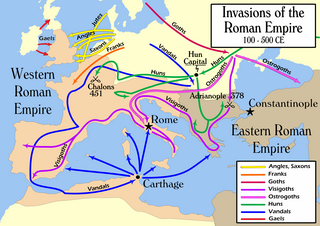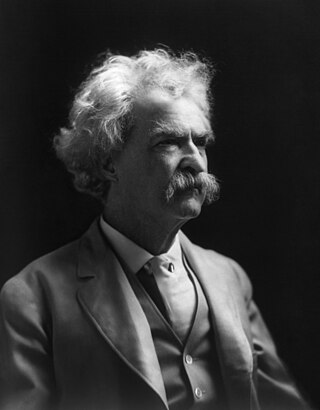Fart is a word in the English language most commonly used in reference to flatulence that can be used as a noun or a verb. The immediate roots are in the Middle English words ferten, feortan and farten, kin of the Old High German word ferzan. Cognates are found in Old Norse, Slavic and also Greek and Sanskrit. The word fart has been incorporated into the colloquial and technical speech of a number of occupations, including computing. It is often considered unsuitable in formal situations as it may be considered vulgar or offensive.

The concept of Germany as a distinct region in Central Europe can be traced to Julius Caesar, who referred to the unconquered area east of the Rhine as Germania, thus distinguishing it from Gaul. The victory of the Germanic tribes in the Battle of the Teutoburg Forest prevented annexation by the Roman Empire, although the Roman provinces of Germania Superior and Germania Inferior were established along the Rhine. Following the Fall of the Western Roman Empire, the Franks conquered the other West Germanic tribes. When the Frankish Empire was divided among Charles the Great's heirs in 843, the eastern part became East Francia. In 962, Otto I became the first Holy Roman Emperor of the Holy Roman Empire, the medieval German state.

Toilet humour, or potty or scatological humour, is a type of off-colour humour dealing with defecation, diarrhea, constipation, urination and flatulence, and to a lesser extent vomiting and other bodily functions.

The Migration Period, also known as the Barbarian Invasions, was a period in European history marked by large-scale migrations that saw the fall of the Western Roman Empire and subsequent settlement of its former territories by various tribes, and the establishment of the post-Roman kingdoms.

A papal bull is a type of public decree, letters patent, or charter issued by a pope of the Catholic Church. It is named after the leaden seal (bulla) traditionally appended to authenticate it.

The Schmalkaldic League was a military alliance of Lutheran princes within the Holy Roman Empire during the mid-16th century. It received its name from the town of Schmalkalden, which is located in modern Thuringia.

Classical antiquity, also known as the classical era, classical period, classical age, or simply antiquity, is the period of cultural European history between the 8th century BC and the 5th century AD comprising the interwoven civilizations of ancient Greece and ancient Rome known together as the Greco-Roman world, centered on the Mediterranean Basin. It is the period during which ancient Greece and ancient Rome flourished and had major influence throughout much of Europe, North Africa, and West Asia.

Philip I, Landgrave of Hesse, nicknamed der Großmütige, was a German nobleman and champion of the Protestant Reformation, notable for being one of the most important of the early Protestant rulers in Germany. He was one of the main belligerents in the War of the Katzenelnbogen Succession.

Flyting or fliting, is a contest consisting of the exchange of insults between two parties, often conducted in verse.

Paul Michael Kennedy is a British historian specialising in the history of international relations, economic power and grand strategy. He is on the editorial board of numerous scholarly journals and writes for The New York Times, The Atlantic, and many foreign-language newspapers and magazines. His monthly column on current global issues is distributed worldwide by the Tribune Content Agency.

The Rise and Fall of the Great Powers: Economic Change and Military Conflict from 1500 to 2000, by Paul Kennedy, first published in 1987, explores the politics and economics of the Great Powers from 1500 to 1980 and the reason for their decline. It then continues by forecasting the positions of China, Japan, the European Economic Community (EEC), the Soviet Union and the United States through the end of the 20th century.

Historic recurrence is the repetition of similar events in history. The concept of historic recurrence has variously been applied to overall human history, to repetitive patterns in the history of a given polity, and to any two specific events which bear a striking similarity.
The Ten Year Rule was a British government guideline, first adopted in August 1919, that the armed forces should draft their estimates "on the assumption that the British Empire would not be engaged in any great war during the next ten years".
German humour is the conventions of comedy and its cultural meaning within the country of Germany. German humour encompasses traditions such as Kabarett and other forms of satire as well as more recent trends such as TV shows and stand-up comedy.

Religious satire is a form of satire that refers to religious beliefs and can take the form of texts, plays, films, and parody. From the earliest times, at least since the plays of Aristophanes, religion has been one of the three primary topics of literary satire, along with politics and sex. Satire which targets the clergy is a type of political satire, while religious satire is that which targets religious beliefs. Religious satire is also sometimes called philosophical satire, and is thought to be the result of agnosticism or atheism. Notable works of religious satire surfaced during the Renaissance, with works by Geoffrey Chaucer, Erasmus and Albrecht Dürer.

The Electorate of Saxony, also known as Electoral Saxony, was a territory of the Holy Roman Empire from 1356–1806. Its territory included the areas around the cities of Dresden, Leipzig and Chemnitz.

Propaganda during the Reformation, helped by the spread of the printing press throughout Europe and in particular within Germany, caused new ideas, thoughts, and doctrines to be made available to the public in ways that had never been seen before the sixteenth century. The printing press was invented in approximately 1450 by Johan Gutenberg, and quickly spread to other major cities around Europe; by the time the Reformation was underway in 1517 there were printing centers in over 200 of the major European cities.
The European balance of power is a tenet in international relations that no single power should be allowed to achieve hegemony over a substantial part of Europe. During much of the Modern Age, the balance was achieved by having a small number of ever-changing alliances contending for power, which culminated in the World Wars of the early 20th century. By 1945, European-led global dominance and rivalry had ended and the doctrine of European balance of power was replaced by a worldwide balance of power involving the United States and the Soviet Union as the modern superpowers.

American decline is the idea that the United States of America is diminishing in power on a relative basis geopolitically, militarily, financially, economically, and technologically. It can also refer to absolute declines demographically, socially, morally, spiritually, culturally, in matters of healthcare, and/or on environmental issues. There has been debate over the extent of the decline, and whether it is relative or absolute.

The war guilt question is the public debate that took place in Germany for the most part during the Weimar Republic, to establish Germany's share of responsibility in the causes of the First World War. Structured in several phases, and largely determined by the impact of the Treaty of Versailles and the attitude of the victorious Allies, this debate also took place in other countries involved in the conflict, such as in the French Third Republic and the United Kingdom.














